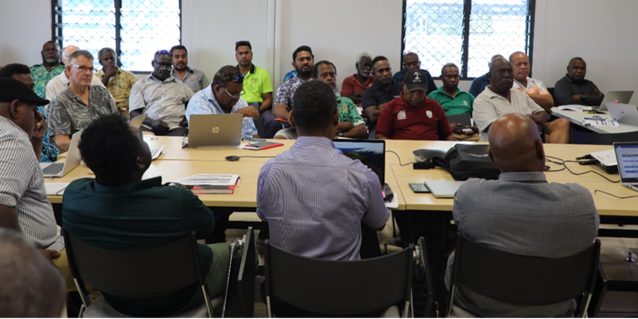The Ministry of Agriculture and Livestock (MAL) Minister Franklyn Derek Wasi has informed Parliament that review work on all agriculture sector policies is ongoing and progressing well.
Minister Wasi revealed when he responded to the speech from the throne in Parliament last week.
He said his ministry (MAL) was tasked with eight policy priorities since the GNUT government came into office, to implement in its first 100 days.
“Review, revise, and amalgamate all agriculture sector policies to align with The Agriculture Sector Growth Strategy and Investment Plan (ASGSIP) 2021-2030 and reflect into the Agriculture Sector Development Policy (ASDP) is progressing well and I am pleased to say that we (MAL) now has a draft policy in place with the first stakeholder consultation last month (August).
“My ministry is expected to provide an inclusive and comprehensive agriculture sector development policy to Cabinet for approval in the month of November after few more consultations with our stakeholders in the provinces and our donor partners.
“…the second policy priority was to “implement a sustainable financing scheme and fixed service grant to stimulate copra and cocoa production to increase export volume”. On that, the ministry is working to operationalize a steering committee comprising of representatives from the ministries of commerce, finance, planning, agriculture, and CBSI, private sector particularly from the cocoa industry working group and CEMA.
“The ministry is about to secure approximately $6 million of fixed grant for both cocoa and coconut from the national government, to be disbursed to qualified farmers and traders as a revolving fund. The steering committee will be responsible for implementation of the revolving fund. Activities qualified under the revolving fund include tools/equipment, trading, farm maintenance and quality assurances,” he explained.
He said that the third policy priority was to enhance support for the development of cash crops and horticultural crops adding its implementation is ongoing.
“The fourth policy priority was to operationalize the Cassava processing facility. My Ministry is pleased to inform everyone that Solomon Islands for the very first time, now has a fully equipped modern cassava processing facility.
“We are assisting the facility to bring over engineers from China to calibrate the cassava processing equipment that were procured from a Chinese supplier last year. With their arrival, the fully equipped cassava processing facility in the Guadalcanal plains (SAPE Farm) will be operational and in good position to export containers of first grade frozen cassava to a buyer in Melbourne within this year. The cassava processing facility will be also able to produce cassava noodles and cassava flour for our domestic market from next year.
“Speaker Sir, another policy priority for MAL was to initiate discussions on the re-establishment of the National Agriculture Training Institute at Fote, Malaita province. The consultations are ongoing and ministry is quite pleased with the response from the landowners who have been very supportive of re-establishing the institute.
“Such facilities are very important for agricultural development more so for our people of Malaita, who are very industrious and shall be the first direct beneficiaries of such facility when it becomes operational. The ministry is still weighing the opportunity costs and a report will soon be furnished to Cabinet for consideration.
“Another policy priority for immediate implementation by the ministry is the “instalment of a Biosecurity Vapor Heat Treatment facility”. Glad to again inform the house and our nation that again, for the very first time, Solomon Islands will soon be able to meet international market requirements for export of fruits, vegetables and root crops. In year 2022, MAL procured a Vapor Heat Treatment Plant from Japan. This treatment plant would be able to treat fruits and other agriculture produce that are susceptible to infection of fruit flies.
“The Solomon Islands has not been able to export fruits like mangoes and melons due to the presence of fruit flies in our country. With the vapor heat treatment plant now ready for operationalization, the future for export of agriculture products like fresh fruits, vegetables and root crops will come to pass.
“A warehouse has been completed and engineers from Japan will travel over to Honiara in November to install the treatment plant, ready for operations. This is a fully funded SIG project and costs around $7 million, inclusive of the treatment plant, warehouse and accessories and logistics.
“The seventh policy priority of the ministry for the past few weeks was, to review the extension services. This is about to be completed with analysis of data collected from all our provinces. Preliminary analyses indicate a very sorry state of our extension services and that, it will need a collaborative approach from every stakeholder.
“We expect a modern approach to rollout services through our extension department, using the technologies that is at our disposal to try and be present in all our constituencies as we strive to make agriculture the economic backbone of our country.
“Speaker Sir, the final policy priority for the first 100 days was, to conduct a feasibility study on Vella La Vella with a view to establish a new oil palm plantation. A scoping report is about to be completed from a field trip conducted by our technical officers. In the report, the ministry is recommending a full feasibility study to be conducted by the investor as the ministry does not have the technical capacity nor the resources to do such at the moment.
“Considering all the challenges in terms of availability of resources and technical capacity within the ministry, I must say here that, I am pleased with the performance of my ministry in the implementation of the GNUT’s first 100 days policy priorities. Despite all the odds, we are about 80 per cent through implementation and hope to achieve most of it by end of the financial year,” Minister Wasi said when he informed Parliament on the policy priorities implementation status.”
- MAL









